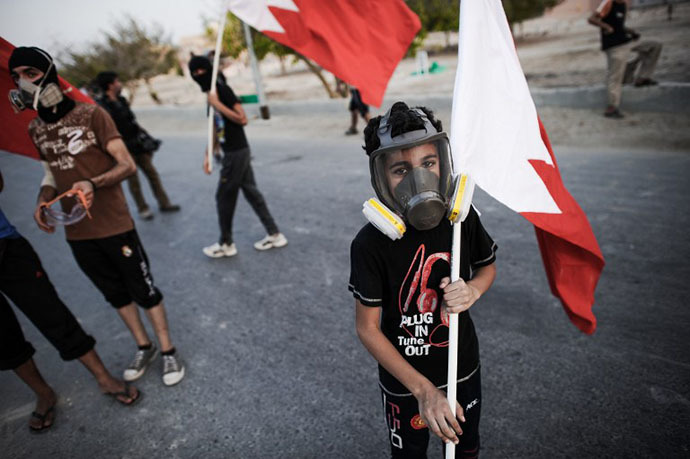HRW evidence of Bahraini child protesters abused, threatened with rape and electrocution ‘only tip of iceberg’
The report confirming that Bahraini authorities routinely detain and abuse children involved in protests is only tip of the iceberg and may lead to the Gulf monarchy losing support from US and UK, HRW’s Nicholas McGeehan told RT.
“Information recently obtained from victims, family members,
and local rights activists suggests that Bahraini authorities
often hold children for long periods in detention and subject
them to similar forms of mistreatment as adult detainees,
including beatings and threats of torture,” the Human Right
Watch press release, which was issued on Tuesday, said.
The rise of protests in Bahrain began during the Arab Spring,
with citizens demanding political reform and a constitutional
monarchy. But the demonstrations later evolved into an outright
call for the ouster of the ruling Al Khalifa family, after its
brutal crackdown on protesters.
McGeehan stressed that the violations described in Tuesday’s
press release show that Bahrain has little respect for its
international human rights obligations.
RT:Tell us more about this. How was this information
obtained?
Nicholas McGeehan: Local rights groups in Bahrain have been
complaining about the detention of children for some time now.
And on the basis of that information, Human Rights Watch has
conducted its own research into the detention of children,
speaking with various victims. And that’s when we came up with
this press release…there’s a press release, actually, rather than
a full report, which we issued.
RT: Based on these accounts, what do these
children go through?
NM: It’s part of a broader crackdown on the Bahraini
society. I mean, obviously, the tensions are very common;
mistreatment and detention is common and it often rises to the
level of torture. What we’ve found is that there’s a failure to
distinguish between child detainees and adults. So, the child
detainees are mistreated in the same manner as adults. I think
the most alarming, concerning issues we found in this brief
research that we conducted was that children being threatened
with rape; children being threatened with electrocution; and
children being beaten. At one point, a beating outside a police
station was only stopped or lessened when a senior officer was
brought on to the bus and he reportedly said: “Beat them, but
do it quietly.”

RT:These are shocking revelations. And how often do such violations occur?
NM: Well, it’s difficult to say. A local rights group told us that – due to the sheer number of detentions – it’s very difficult for them to document each one; to document its lawfulness; and to ascertain the ages of the children involved. It’s fair to say that we’ve received numerous reports of child detentions. We document as many as we can, but the evidence that we produced would appear to be perhaps only the tip of the iceberg, unfortunately.
RT:Do you expect a reaction from Bahraini authorities?
NM: Judging from their reaction to previous accusations – most probably, a denial; most probably, an assertion that those people, who have been detained, have been engaged in some sort of terrorist activity. I think it’s undeniable that the Bahraini authorities have exaggerated the threat of such activity to justify repressive measures. It would be interesting to see the response of it allies – the UK and the US – I think in this regard. These allegations might weaken support to the Bahraini regime and put them in a very difficult situation.
RT:Bahrain is a party to the UN Convention on the Rights of a Child. Could its adherence be reviewed in light of this information?
NM: It was criticized heavily in the last review of its adherence to the [UN Convention on the] Rights of a Child. It’s also a party to the [UN] Convention against Torture and its violations of that convention are well documented. Increasingly, Bahrain is a state which seems to hold little regard for its international obligations to do with human rights law, regrettably.
The statements, views and opinions expressed in this column are solely those of the author and do not necessarily represent those of RT.
The statements, views and opinions expressed in this column are solely those of the author and do not necessarily represent those of RT.












